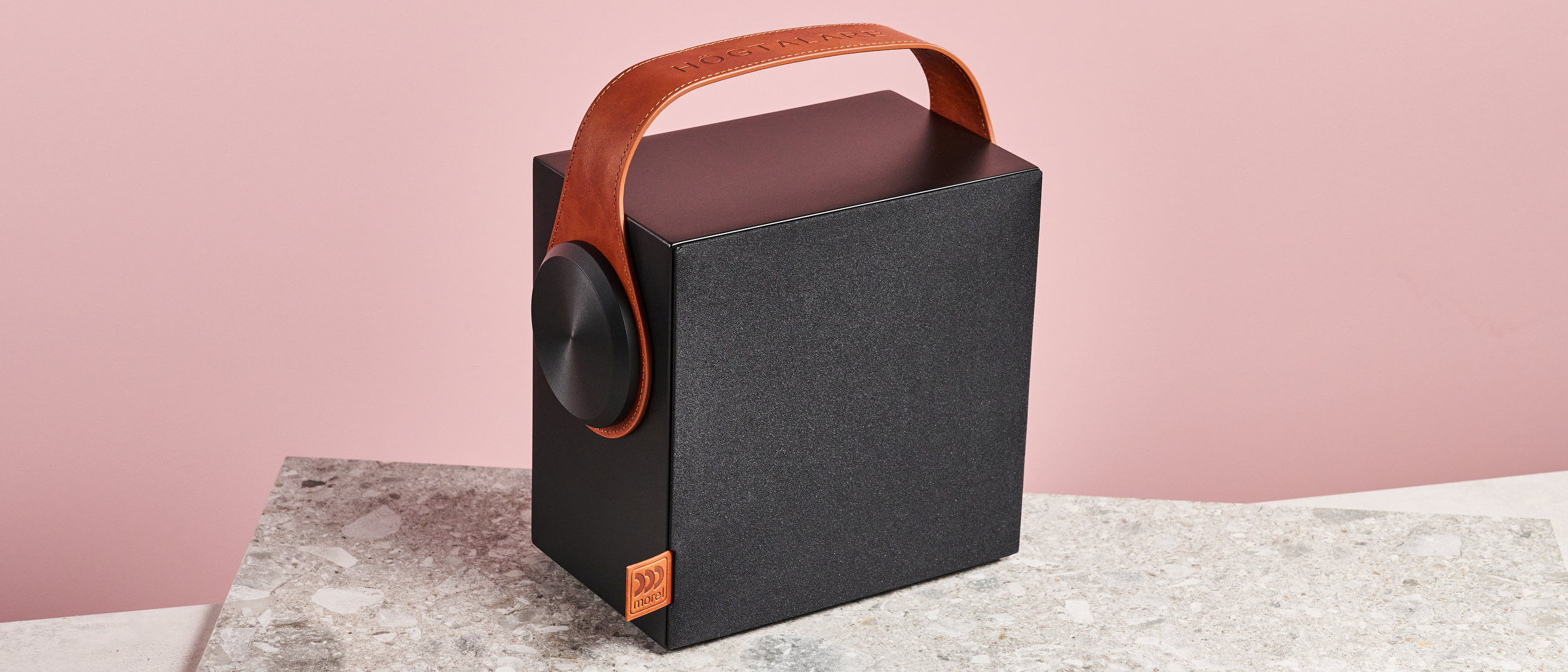TechRadar Verdict
Chic enough to adorn any home, the Morel Biggie Bluetooth speaker certainly looks the part and has the build quality to match. However, while the sound is impactful for its size it becomes overbearing too often. Combine this with the lackluster functionality and substantial weight, and the Biggie falls short of being a standout portable speaker. It costs more than many of its closest rivals, but those cheaper speakers have the Biggie beat in most areas.
Pros
- +
Exceptional design
- +
Powerful sound
- +
Easy to use
Cons
- -
Bothersome low-end boom
- -
Heavy to carry around
- -
Lacking features
Why you can trust TechRadar
Morel Biggie: Two-minute review
The Morel Biggie is the smaller sibling of Morel’s Högtalare (Swedish for speaker) – and is ironically named, given its compact size. But don’t let that fool you, because sonically it packs a punch.
It oozes class thanks to its superb engineering, evident from the perfectly planned surfaces on every side. It’s hard to imagine it looking out of place in any home, especially given the myriad colorways available. But home is where you’ll want to keep the Biggie, because even though Morel describes it as a portable speaker, it’s still too big and heavy to be carried around easily.
True to form, the Biggie’s feature set is similarly spartan, even for a Bluetooth-only speaker. One for our best Bluetooth speakers buying guide? Well, there’s no app to control or alter its settings, which is a pretty big omission and one the bulk of the competition (even at much lower price-points) does offer in 2024. There are five buttons for operation, but the only additional interface feature is the battery level indicator. And this is poorly implemented, requiring you to hold both volume buttons to reveal the level via the LEDs of all five buttons, which is far from precise.
As for audio features, the biggie (sorry) is Auracast compatibility, which allows you to join Auracast audio streams, designed for broadcasting to an unlimited number of playback devices. You can also use two Biggies in unison for stereo playback, although I was unable to test this feature as I was only given one unit to review.
The Biggie makes a strong impression on first listen, bellowing out the bass notes and creating a sense of space that rivals some of the best Bluetooth speakers out there. Mids and highs are mostly clear and detailed, but there are too many occasions when that low-end dominates the sonic space, masking the subtleties of other frequencies.
Morel’s dynamic EQ also fails to achieve its goal of optimizing the listening experience depending on volume, and the lack of hi-res codec support means there’s no way to improve the audio further.
Battery life is also average, and during my tests it failed to live up to its claimed 20 hours, ending up closer to 16. Fast charging is available, though, which means going from empty to full takes just two hours and only 20 minutes to get four hours of playback.
Sign up for breaking news, reviews, opinion, top tech deals, and more.
As for price, the Biggie is undeniably costly, and it seems most of your money is going towards the superlative build quality. The lack of features could be forgiven if the sound was truly exceptional, but it fails to deliver on that front too.
If it’s features you’re after, Sonos’s range of speakers, including the Sonos Roam 2 and Sonos Era 100, offer a ton of options and customizations plus wi-fi support, and cost less than the Biggie. If you want a standout sonic performer, the Audio Pro C20 is one of the best in that department.
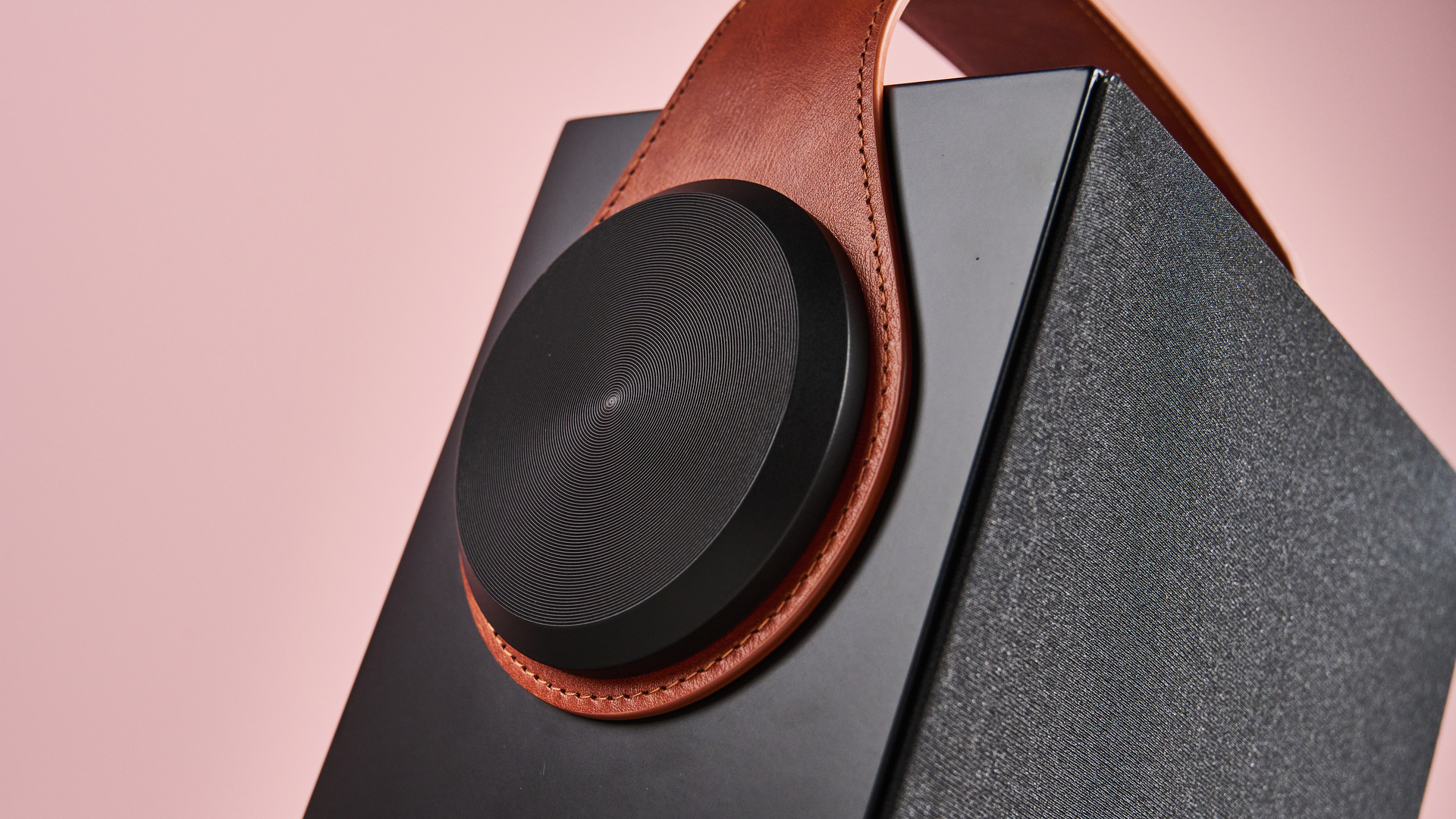
Morel Biggie review: Price & release date
- $299 / £299 / $AU499
- Multiple colorways
- Available worldwide
The Morel Biggie is available now for $299 / £299 / $AU499. It comes in several colorways, ranging from monotones and oak to shades of blue, green, and red. The faux leather strap is either black or brown, depending on the colorway.
It sits towards the higher end of the market, making it more expensive than the Sonos Era 100, our current pick as the best wireless speaker. It is considerably cheaper than the Era 300, though, which is slightly bigger than the Biggie, and features Dolby Atmos support plus multi-room audio using your home wi-fi network, among other technologies.
There are also cheaper alternatives that offer better portability, such as the Sonos Roam 2, our number one pick overall for Bluetooth speakers, and the B&O Beosound A1 Gen 2, which we think is the best for sound quality.
Morel Biggie review: specs
| Weight | 2.6kg / 5.7lbs |
| Dimensions | 7.2 x 7.2 x 4.6 inches (182 x 182 x 116mm) |
| Battery life (quoted) | 20 hours |
| Connectivity | Bluetooth 5.3 BLE |
| Speaker drivers | 1 x 4-inch woofer, 1 x 1-inch soft dome tweeter |
| Streaming support | Auracast |
| Aux-in | 3.5mm |
| Charger port | USB-C |
| Microphone | No |
| Waterproof rating | None stated |
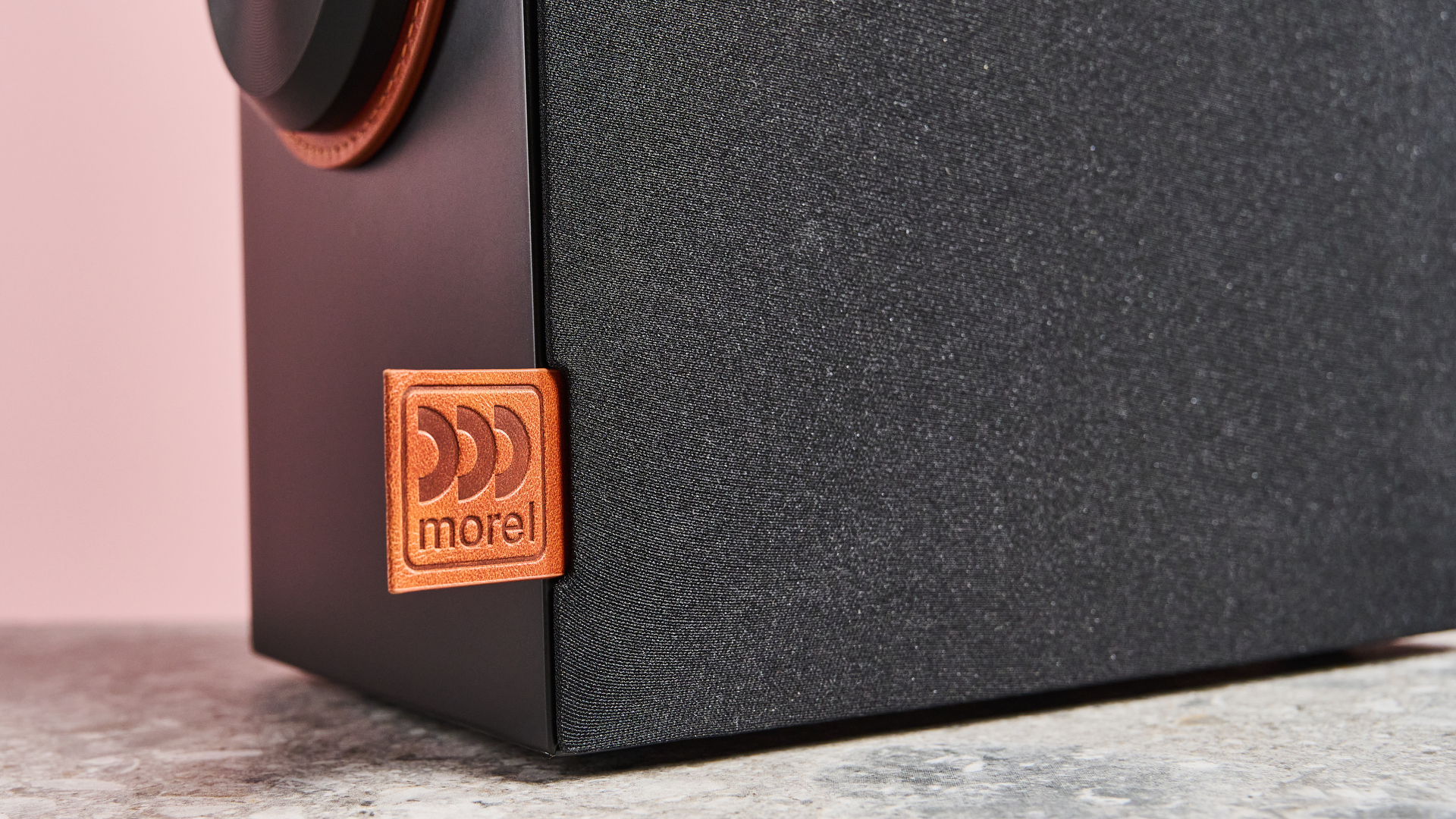
Morel Biggie review: Features
- Bluetooth and 3.5mm AUX playback
- Stereo playback possible
- No app
In terms of functionality, the Biggie is about as simple as wireless speakers get. There are only five buttons on the Biggie: one for power, two for volume, one for pairing, and one for switching between wired or wireless connections. On the back is a single USB-C port for charging the speaker, which can also be used for charging a phone (although this didn’t work with my Google Pixel 7a). The port doesn’t allow for wired playback, though – there’s a 3.5mm AUX input for that.
There’s also very little in the way of audio enhancements, with no support for Dolby Atmos, Spatial Audio, and hi-res codecs like aptX. It is Auracast compatible, which lets you join audio broadcasts that can potentially reach an unlimited number of playback devices. You can use two units together in stereo, but as I only had one test unit, I couldn’t try this out.
There’s only one way to use the Biggie wirelessly and that’s via Bluetooth. While it paired instantly with a FiiO M11S music player, it struggled to connect to my Pixel 7a. It remained stuck in pairing on the first attempt, and on the second it paired but failed to establish a connection, with the Biggie’s pairing button flashing interminably. After pressing the mode select button twice it connected successfully. Of course, minor glitches like this can occur when pairing devices, but I’ve never had an issue pairing the latest audio devices with my phone before, and it’s a blemish on a speaker of this price.
To check the battery level, you have to hold both volume buttons for two seconds. The lights of all five buttons indicate the battery's remaining charge, making for an imprecise measurement – and since there’s no app, it’s the only option. Again, it’s an oversight on a modern-day premium wireless speaker to have no mobile app of any kind.
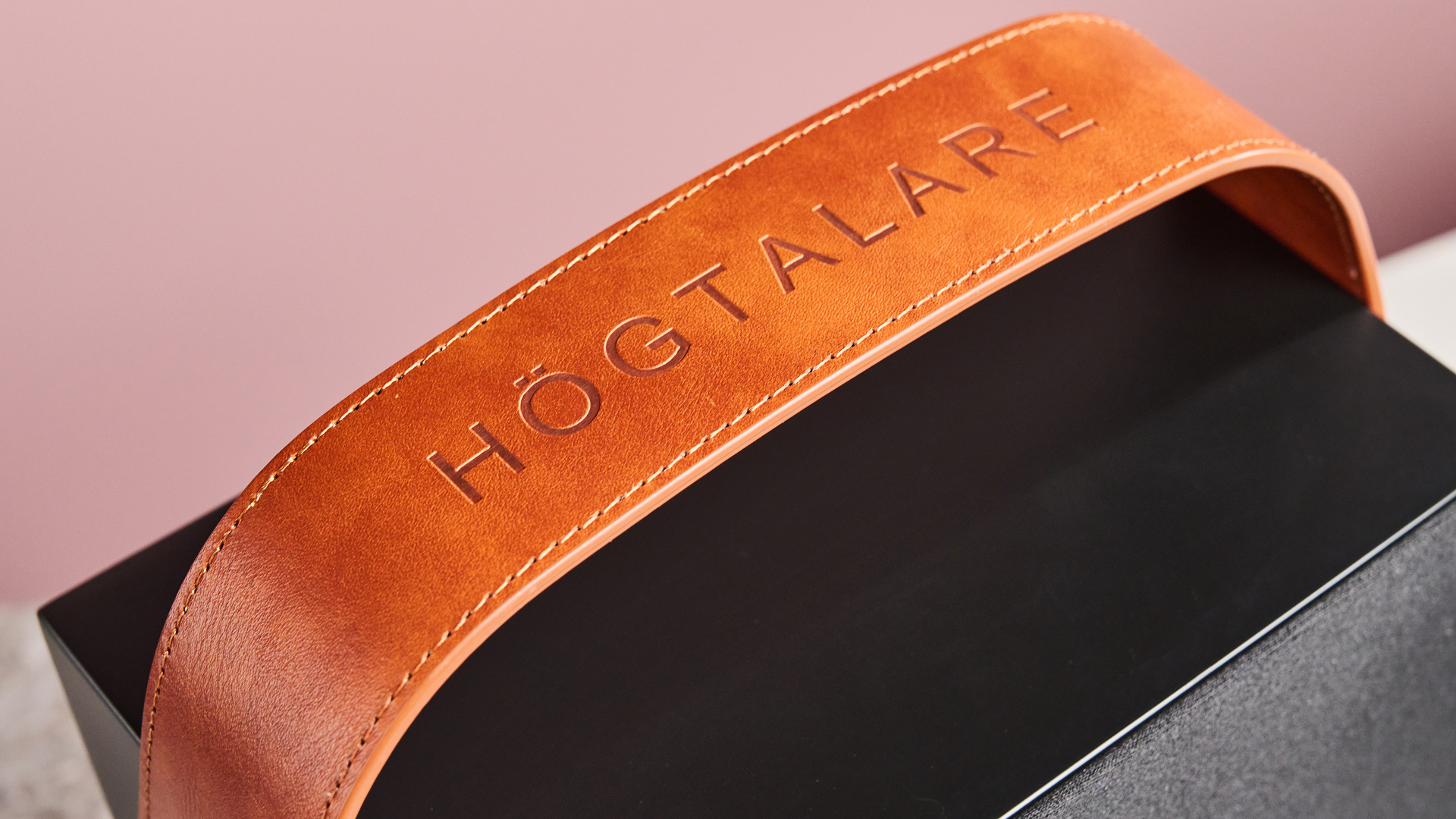
There are other issues with the battery indicator too. When I tried checking the level on a full charge, all five buttons flashed very quickly and faintly, which seemed like a glitch of some kind. Also, when holding the two volume buttons together they’re obscured, so when the battery is between 21-40% or 10-20% – which is when only the volume buttons will light – you can’t see the readout until you’ve taken your fingers away. Suffice to say, it’s not the most elegant solution – ironic given it’s designed to preserve the Biggie’s minimalist design.
Morel claims the battery will last up to 20 hours, which is reasonable for a wireless speaker. Things didn’t get off to a good start during my tests, though: after only one hour of continuous playback, it dropped to four lights, indicating a level of between 61-80% (I believe it was closer to the latter figure).
However, for the next five and a half hours of playback, it remained at this level before dropping to about 60%, so thankfully the battery’s rate of depletion didn’t follow its initial trajectory. Extrapolating beyond this figure, though, the Biggie still falls short of its purported lifespan: realistically, it’s closer to 16 hours.
- Features score: 2/5
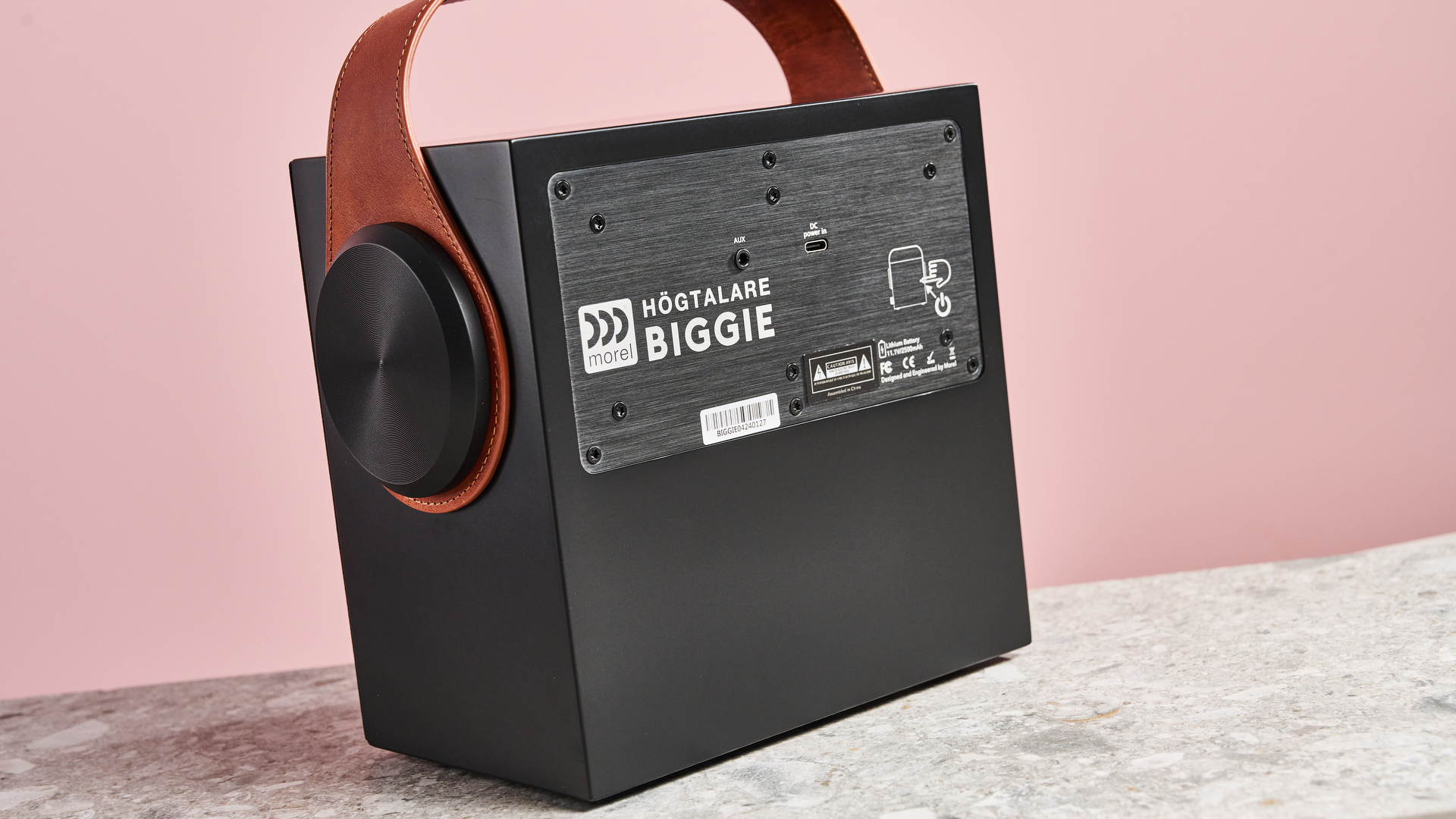
Morel Biggie review: Sound quality
- Full and rich sound
- Excessive boom
- No hi-res codec support
Given the compact size of the Biggie, the bass sounds are surprisingly full and powerful, with plenty of punch. Highs are crisp and mids are clear for the most part. What’s most impressive is the sense of space the Biggie imparts, doing an admirable job of rendering the kind of experience you’d expect from a much larger speaker.
However, the Biggie is all too prone to excessive amounts of boom, even with the volume low; the so-called dynamic EQ fails to keep the sound in check at all levels as is claimed, and it’s unable to rein in mild distortion at higher levels. The speaker is definitely best experienced at a distance, but even then, that boominess all too often masks the finer details, especially in classical and other string-heavy music.
It’s also a shame that a speaker aiming for the premium end of the market only supports lossy SBC and ACC codecs, losing out on the higher fidelity offered by LDAC, aptX (which the larger Högtalare supports), and others. Using a wired connection via the 3.5mm AUX input doesn’t improve matters either, sounding near-identical to its wireless counterpart.
The volume controls don’t offer enough increments, with the lowest possible setting still too loud and boomy for more discreet listening. They also frequently clash with the volume controls on playback devices, with one overriding the other. A dedicated app could’ve kept volume levels consistent between speaker and source. It could’ve also offered an adjustable EQ for those who like to dial in their preferred settings.
- Sound quality score: 3/5
Morel Biggie review: Design
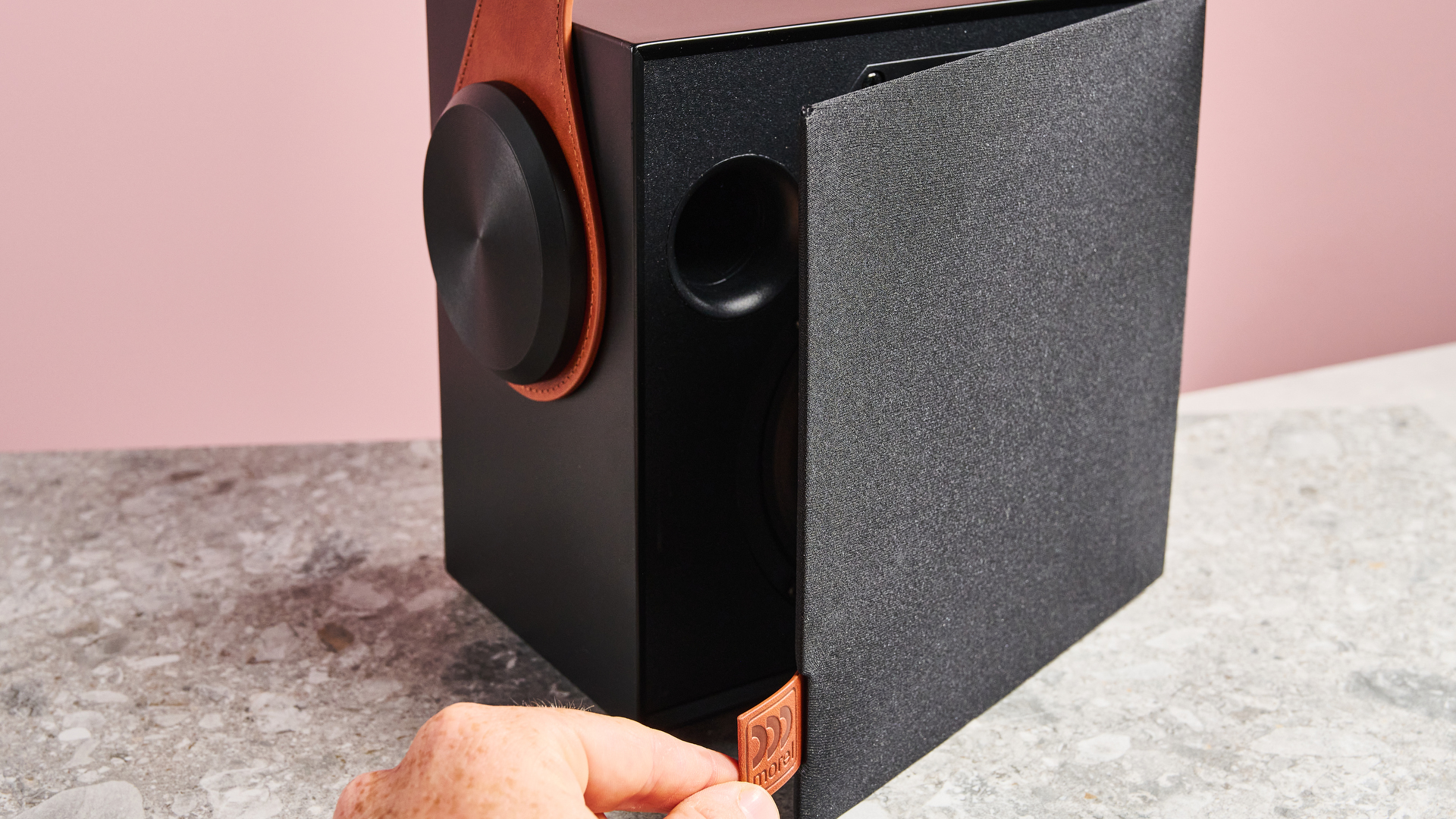
- Brilliant build quality
- Ultra-minimalist
- Weight compromises portability
It’s clear the Biggie is going for the sleek, ultra-minimalist look, with a hint of tradition courtesy of the large faux leather handle – which, together with the strap locks, serves to imitate a pair of headphones, a design choice I have to believe was intentional.
The overall engineering of the Biggie is impeccable, even down to the included USB-C cable. Every edge and fixture is solid and seamless, although the fitting of the back panel in my test model wasn’t quite perfect. Still, it was more than acceptable and barely a cause for complaint.
Every side of the Biggie is completely flat, making it easy to fit anywhere in your home. The four rubber feet are thick and sturdy, keeping the Biggie firmly planted. However, despite Morel claiming it to be a portable speaker, it’s too cumbersome and heavy to take on your travels. Really, this is an indoor speaker meant to be kept in place.
The aforementioned strap can be removed if you want to streamline the Biggie even more, simply by unscrewing the side clamps. There’s an optional wall mount available from Morel, should you wish to declutter your space even more.
The magnetic cloth grill is incredibly slick and, again, feels engineered to the highest standards. A small yet sturdy leather tab can be used to pull the panel off, although it's a little surplus to requirements, more of a style accessory than anything else. The fit and finish of the panel are faultless, and it's an incredibly elegant solution to masking the buttons that sit behind, invisible until the LEDs shine through once powered on.
But despite the quality of the grill, I do worry that the thin cloth will degrade after repeated button presses through it. After only a few days with the Biggie, I began to notice a crease running up the cloth from repeated compressions against the large button panel.
Another issue is that you can’t see the power button when it’s off. Muscle memory will take hold quite quickly, but it’s still a quirky design choice to hide it from view completely and illustrates just how committed Morel is to the Biggie’s minimal aesthetic.
True to the rest of the speaker, the Biggie’s buttons are solid yet light to the touch, with a pleasing clack to the presses. Their fit isn’t quite as perfect as other aspects of the Biggie’s overall construction, but I’m nitpicking here; they’re certainly up to the standards you would expect from a speaker of this price.
- Design score: 3.5/5
Morel Biggie review: Value
At $299 / £299 / AU$499, there’s no denying the Biggie is an expensive wireless speaker. It’s more expensive than the Sonos Era 100, our number one pick for the best wireless speaker, which has more features and the brand’s unique ability to create a network of speakers for a complete home setup.
If you’re looking for a more portable experience, then our current pick for the best Bluetooth speaker, the Sonos Roam 2, is cheaper than the Biggie and fits in your luggage nicely thanks to its pill-like shape. It also has an IP67 waterproof rating, making it ideal for travel. Overall, it’s a more versatile performer than the Biggie.
Other similarly premium speakers include the Bose SoundLink Max, which is sturdy and portable but $100 more than the Biggie. Being a hardy, go-anywhere speaker, though, it’s also got an IP67 rating, and a battery life that actually lasts the 20 hours it claims, according to our tests.
Should I buy the Morel Biggie?
| Attribute | Notes | Rating |
|---|---|---|
| Features | There’s very little to accompany the Biggie. You get Bluetooth and wired connectivity, but there’s no app or any way to make personalized adjustments. | 2 / 5 |
| Sound quality | Big, full, and clear for the most part, but a lack of hi-res codecs is disappointing, and the boom can overshadow the listening experience. | 3 / 5 |
| Design | The minimal look is complemented by fantastic build quality. Cloth degradation might be a problem, though, and the battery indicator is impractical. | 3.5 / 5 |
| Value | The Biggie is expensive, and it faces tough competition in a saturated market. It’s up there in terms of build, but the sound and features are lacking. | 2 / 5 |
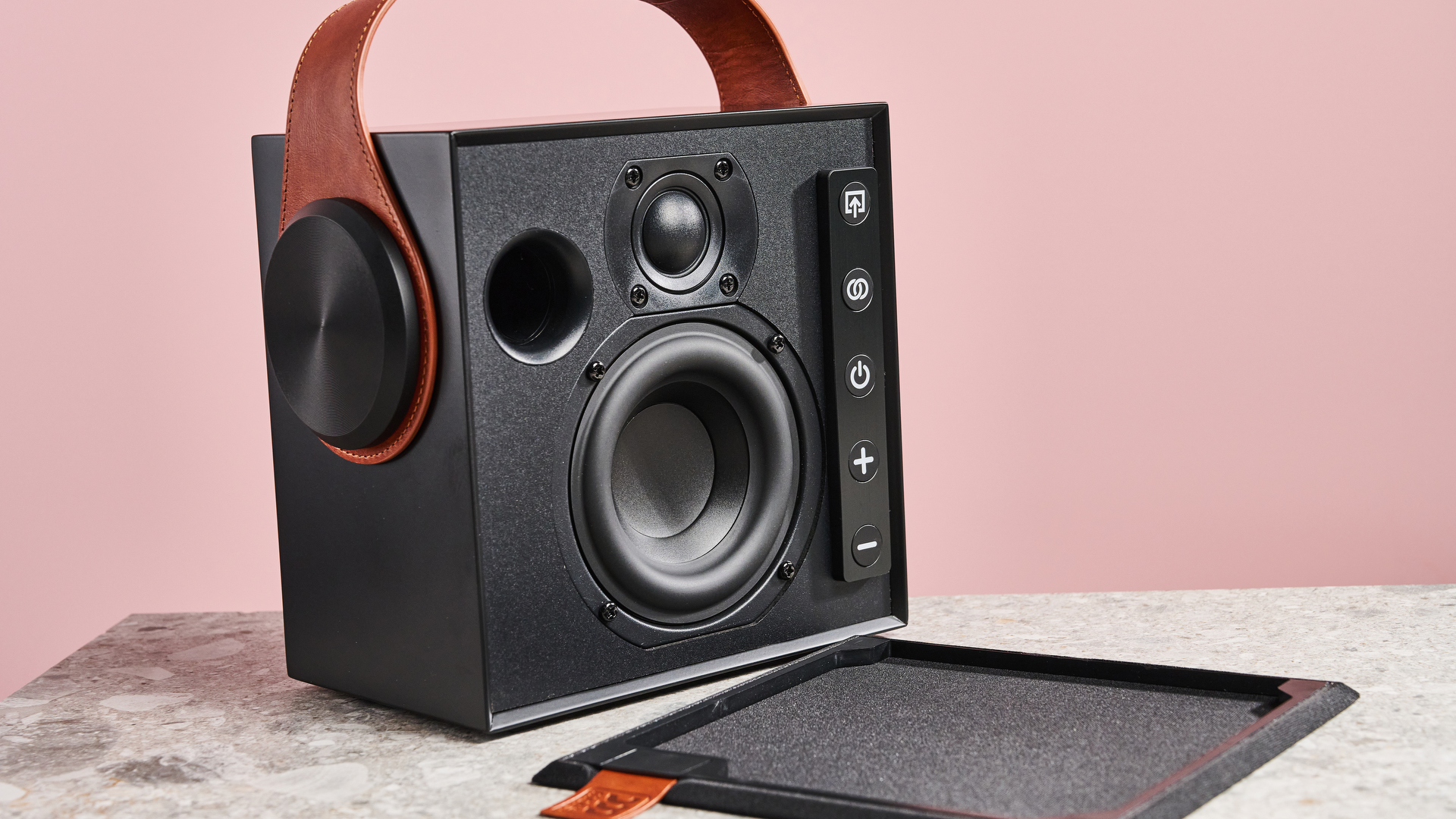
Buy it if...
You adore minimalism
If you want zero fuss in your speaker, then look no further than the Biggie. It’s as clean as they come and fits in virtually any space in any home.
You want a sense of space
For such a small unit, the Biggie impresses with its all-encompassing soundscapes. The low-end response is also powerful.
Don't buy it if...
You want the best sound
The Biggie gets boomy all too easily, and the lack of any hi-res codec support is a real shame on a speaker this premium.
You want plenty of features
There are no extras on the Biggie: you get Bluetooth and wired playback, and a few buttons for control. There’s no app or settings to adjust.
You want portability
Despite what Morel says, you’ll struggle to carry the Biggie around comfortably. There are plenty of Bluetooth speakers out there that are much better suited for this purpose.
Morel Biggie review: Also consider
Sonos Era 100
The Sonos Era 100 is at the top of our wireless speaker list for a reason – and that is stellar sound that’s improved even over its sibling, the Sonos One, including better bass tones and a wider broadcast for optimal listening across a larger area. It also undercuts the Biggie on price.
Find out more in our Sonos Era 100 review
Tribit Stormbox Micro 2
If you’re after something more budget-friendly, the Tribit is one of the best Bluetooth speakers around. The sound quality belies its tiny size and it comes packed with features, including a power bank function, a built-in strap that can fit on your bike, and a microphone.
Read our full Tribit Stormbox Micro 2 review
How I tested the Morel Biggie
I tested the Morel Biggie for about a week and tried it with a variety of playback sources, including my phone, a laptop and a music player. I tested both its Bluetooth and wired capabilities.
I mainly listened to music via Tidal, a streaming service that allows for hi-res playback, although this wasn’t applicable in the Biggie’s case, reverting to the SBC/ AAC formats instead. I used TechRadar’s specialized playlist, designed to put audio devices through their paces with a comprehensive mix of genres and sonic styles, ranging from pop and electronic dance, to jazz and classical across multiple eras.
I tested the battery by letting the Biggie run continuously for six hours and took readings about every hour. Since there’s no volume readout, I can’t say exactly what levels I had set but suffice to say, I would describe my sessions as being comfortably loud.
First reviewed: September 2024

Lewis Maddison is a Reviews Writer for TechRadar. He previously worked as a Staff Writer for our business section, TechRadar Pro, where he gained experience with productivity-enhancing hardware, ranging from keyboards to standing desks. His area of expertise lies in computer peripherals and audio hardware, having spent over a decade exploring the murky depths of both PC building and music production. He also revels in picking up on the finest details and niggles that ultimately make a big difference to the user experience.
